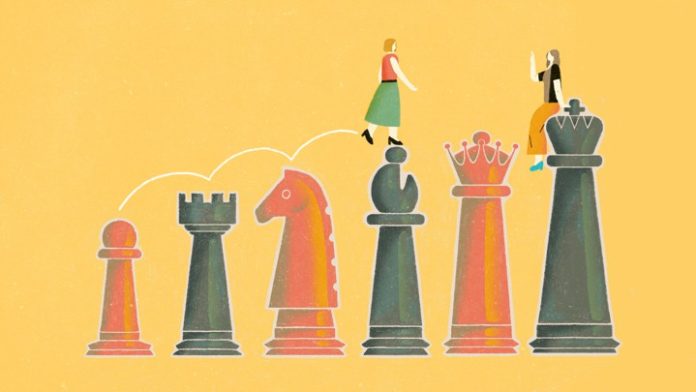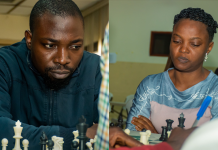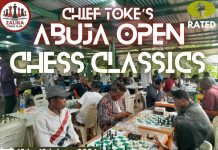The Friendship Files features a conversation between two Hungarian master chess players: Judit Polgár, who is widely considered the best female chess player of all time, and Anna Rudolf, who grew up idolizing Judit as a child. Anna became an elite player herself, and ended up meeting and befriending Judit (who is now retired) through the Hungarian chess community. In this interview, they talk about the social scene at chess competitions and facing sexism in a male-heavy environment, and Anna discusses what it’s like to become friends with your childhood hero.
The Friends:
Judit Polgár, 43, a retired chess grandmaster and creator of the Global Chess Festival who lives in Budapest
Anna Rudolf, 32, a chess international master and broadcaster who lives in Zaragoza, Spain
Julie Beck: I don’t know much at all about chess at the professional or elite level. How do you get from just being a really good chess player to doing it full-time?
Judit Polgár: I started playing chess when I was 5 years old, so it was kind of like my mother tongue. To become a professional, you have to train a lot, which I did from a very early age. Of course, it helps if your character is very competitive and you have patience and perseverance.
Then I was competing quite a lot. Competitions last about 10 days or two weeks. I was homeschooled, so in this way, I could train on a daily basis for many hours. And then I was travelling all over the world.
Anna Rudolf: I was never a professional chess player. I would call it semi-professional. I kept on going to school because I didn’t think that my chess skills were good enough for making it a full profession. I, of course, always loved playing chess. And I competed, and I wanted to get into the Olympic team. But I wanted to have something else as a job because I didn’t think I would get anywhere near the heights of Judit. It’s very difficult to be Judit Polgár.
Judit: We had different lives. She was going to school; I wasn’t. I have two older sisters and I grew up in a very special environment. My parents devoted their lives in order to raise us to become professional chess champions. So for me it was not really a question of What is going to be my work? I started to become internationally successful starting at the age of 9. But in Anna’s case, of course, she was going to school, and actually she was a member of the [Hungarian] Olympic team. She was always so dedicated in the team.
Beck: How would you describe the social scene of high-level chess? Is it friendly? Is it competitive?
Judit: On the highest level, of course, there’s a lot of competitiveness and drive in the players. They really want to win. But it’s normal that the players are also just friends. Even very close friends. Or rivals, but in a healthy way. It is common that people go out after the game for a walk or they have dinner together. [During the game], they would like to tear each other apart, but after, they are friends.
Anna: In chess, we have olympiads every two years, and in the years when there’s no chess olympiad, we compete in the European championships. That’s where I started to get to know Judit, because, in those team events, the different nations tend to go have dinner together, walk together, go on excursions together. Those are bonding moments.
Beck: Anna, you said that you admired Judit long before you ever met or knew her. What was it like to actually get to know somebody you used to be starstruck by?

Anna Rudolf (left) and Judit Polgár (right) live-streaming events from the Global Chess Festival in Budapest in October 2017. (Courtesy of Anna Rudolf)
Anna: She’s been my idol ever since I was a kid. Everybody knows Judit in Hungary.
The moment I got onto the team and ended up being able to sit at the same dinner table with my role models, I felt like, Oh my God, am I dreaming? I like the games of Judit and Peter Leko, and they were both on the team. They were so friendly and kind. What was really curious to me was that these idols I’ve had, they were just like real human beings, not some distant star that wouldn’t even talk to you. You could talk to them about any topic; you would have a good laugh. They were like normal people, you know?
Beck: Have you and Judit ever competed against each other?
Anna: [When I was 11], my family and I travelled to Budapest so that I could play in a simultaneous exhibition against her. I wore my favourite white pants. That was the one time that I played against her, and I remember that I got crushed immediately.
Beck: What is a simultaneous exhibition?
Judit: You have to visualize it like there are a lot of chessboards set up next to each other in a circle, and then I’m playing against, let’s say, 20 people at the same time in one room. I make my move, and then I move from one table to another. It takes about two or three hours, this exhibition.
Anna: After the game, she politely shook my hand and signed my score sheet. I guarded that piece of paper as a treasure. It had a smiling face in the letter J, which I really liked. To this day, she signs her name like that.
Beck: How did you go from being on the team together to being friends outside of chess?
Judit: Actually, we were not [exactly] teammates in the Olympics, because Anna was playing in the ladies’ team and I was playing in the open section with the guys. Later on, we started to work together. Anna offered to help promote the Global Chess Festival [which I created]. This is going to be the fifth year. We were brainstorming, talking, and of course when we were doing that, we started talking about private-life things. The friendship was going deeper the more time we spent with each other. [And last year], at the chess world championship, Anna was doing the commentary, I was the host, and we were working every day like six, seven, eight hours.

Beck: Any standout memories from the world championship or the festival?
Anna: Judit, do you remember the one night that we finished filming so late? I think it was two years ago; this is one day before the festival. We have been filming the whole day, different videos that we wanted to show on the broadcast. It was extremely late. The restaurant is about to close; we can barely get food. But even though we’re exhausted and the next day we have to wake up very early, it was still a very good mood. Just laughing throughout the whole dinnertime. It’s difficult to describe what made that atmosphere so special.
Judit: I think what makes it special is, our attitudes are very similar. We do something we love, we try to do things we believe in, and we are very passionate about it. The flow goes for many hours. It creates this atmosphere with a lot of laughing and humor and irony. You need all of this to survive all kinds of difficult and tiring situations. I think it was even more important when we were doing the world-championship match. It’s a great thing that you can count on: that whatever goes wrong, the other [person] will try to pull you out of it.
Beck: My perception from the outside is that chess can be kind of a male-dominated world. Do you feel like it’s helpful to have a female friend who understands the world you’re in?

Judit and Anna took a trip to Norway in November 2015. (Courtesy of Anna Rudolph)
Judit: I think, generally speaking, whenever you are successful, you will meet more guys around you than women. You have to have your fighting spirit, your perseverance. I was always competing with the guys from a very young age. It didn’t cause me too much trouble. Sometimes I was the only lady who was playing in the competitions, but I have the kind of character that I didn’t mind.
For Anna, people think that things come easy for her because she’s a blondie. But actually, I think she works more than most of the guys.
Anna: Likewise. Even though you are not a blondie.
Judit: I’ve not had to face very bizarre situations like [Anna did] when she was 20 years old. [She’s a] pretty, young, nice girl. And she plays incredibly well. She made the tournament of her life. And just because she was a girl and a blondie, people started to accuse her of cheating. It’s not so easy to handle, to be accused of something like that.
Anna: That was in 2007. It was an open tournament in France. I was leading the tournament after four rounds. With just one round to go, I was still leading, and that’s when the arbiter came to me and said, “There are some people who think that you may be using assistance in your games.” The arbiter himself and the organizers, they didn’t believe it, but they wanted to make sure that people were not complaining. So they took away my backpack and they checked my lip balm because I’d had it on the table. The accusers thought that I had a microchip in my lip balm that was connected to wireless internet in my backpack and whenever I opened the tin of the lip balm, I would see the right move to make on the board.
Judit: That was a huge blow and teaching from life to her of how unfair it can be, but you have to fight on. Right?
Anna: That’s true. And you also get some comments, [someone saying] he would never lose to a woman or something very sexist along that line.
Judit: Oh, there have been many sexist lines like that. The guys can, many times, barely believe that your results are just good because you’re good. Of course, you shouldn’t think everybody thinks that, but there are some who think that way. For handling such a situation, you have to have a strong character to go on.
Beck: To wrap up, can you describe each other’s style of playing chess? Does it reflect your personality?
Judit: I haven’t seen so many games of Anna’s. In those team competitions playing for Hungary, I know that she was playing very long games. She had this fighting spirit. Her strengths were her focus and dedication. Generally speaking, you’re a person who prepares as much as you can for a game, and then you focus and you give the maximum.
Anna: I obviously can say the same about Judit. She puts 120 percent in every game. The determination, the focus—they are among the many reasons why she got to be the only female player that made it into the top 10 [players in the world]. Judit is famous for her fighting spirit, for her aggressive attack in chess. She’s one of the best-attacking players in the world. That is among women and men together.
I agree that your personality over the chessboard reflects how you are in life. Even though Judit doesn’t compete anymore, she’s still extremely passionate about chess and she promotes it in every way possible. She wants to promote the message of the Global Chess Festival: that chess can unite people regardless of your gender, your age, your profession, your income. It is a connecting bridge between many types of different people who may not be able to communicate with each other. But they can play and understand each other through the game, or they can become friends as we did.
Source: www.theatlantic.com















